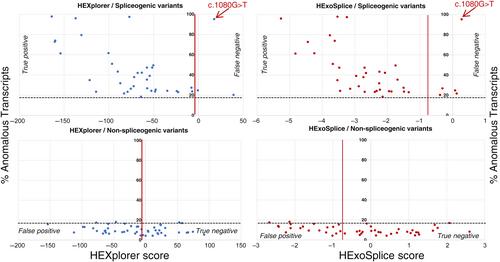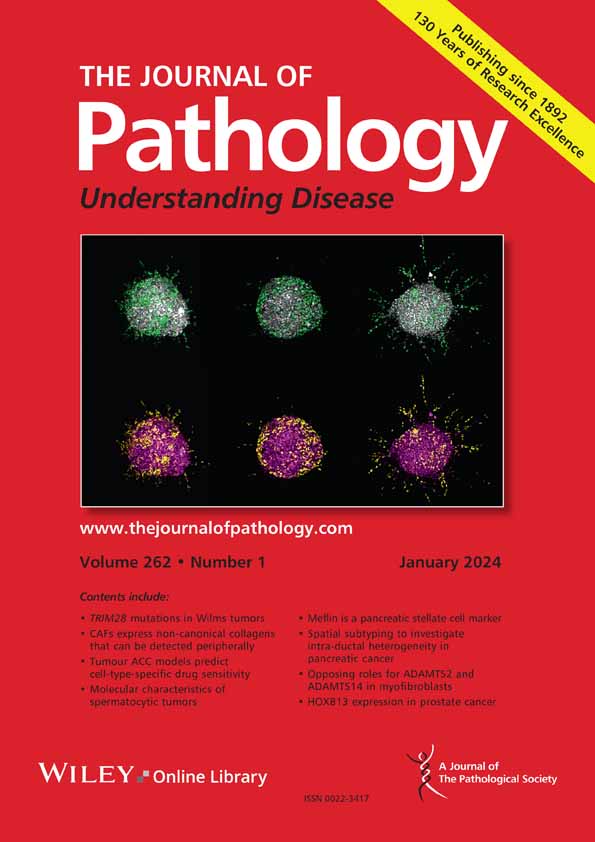下载PDF
{"title":"对CHEK2第8和第10外显子的替代剪接进行综合分析,发现了三个增强子/沉默子富集区和38个剪接变体。","authors":"Lara Sanoguera-Miralles, Inés Llinares-Burguet, Elena Bueno-Martínez, Lobna Ramadane-Morchadi, Cristiana Stuani, Alberto Valenzuela-Palomo, Alicia García-Álvarez, Pedro Pérez-Segura, Emanuele Buratti, Miguel de la Hoya, Eladio A Velasco-Sampedro","doi":"10.1002/path.6243","DOIUrl":null,"url":null,"abstract":"<p>Splicing is controlled by a large set of regulatory elements (SREs) including splicing enhancers and silencers, which are involved in exon recognition. Variants at these motifs may dysregulate splicing and trigger loss-of-function transcripts associated with disease. Our goal here was to study the alternatively spliced exons 8 and 10 of the breast cancer susceptibility gene <i>CHEK2</i>. For this purpose, we used a previously published minigene with exons 6–10 that produced the expected minigene full-length transcript and replicated the naturally occurring events of exon 8 [Δ(E8)] and exon 10 [Δ(E10)] skipping. We then introduced 12 internal microdeletions of exons 8 and 10 by mutagenesis in order to map SRE-rich intervals by splicing assays in MCF-7 cells. We identified three minimal (10-, 11-, 15-nt) regions essential for exon recognition: c.863_877del [ex8, Δ(E8): 75%] and c.1073_1083del and c.1083_1092del [ex10, Δ(E10): 97% and 62%, respectively]. Then 87 variants found within these intervals were introduced into the wild-type minigene and tested functionally. Thirty-eight of them (44%) impaired splicing, four of which (c.883G>A, c.883G>T, c.884A>T, and c.1080G>T) induced negligible amounts (<5%) of the minigene full-length transcript. Another six variants (c.886G>A, c.886G>T, c.1075G>A, c.1075G>T, c.1076A>T, and c.1078G>T) showed significantly strong impacts (20–50% of the minigene full-length transcript). Thirty-three of the 38 spliceogenic variants were annotated as missense, three as nonsense, and two as synonymous, underlying the fact that any exonic change is capable of disrupting splicing. Moreover, c.883G>A, c.883G>T, and c.884A>T were classified as pathogenic/likely pathogenic variants according to ACMG/AMP (American College of Medical Genetics and Genomics/Association for Molecular Pathology)-based criteria. © 2024 The Authors. <i>The Journal of Pathology</i> published by John Wiley & Sons Ltd on behalf of The Pathological Society of Great Britain and Ireland.</p>","PeriodicalId":232,"journal":{"name":"The Journal of Pathology","volume":"262 4","pages":"395-409"},"PeriodicalIF":5.6000,"publicationDate":"2024-02-09","publicationTypes":"Journal Article","fieldsOfStudy":null,"isOpenAccess":false,"openAccessPdf":"https://onlinelibrary.wiley.com/doi/epdf/10.1002/path.6243","citationCount":"0","resultStr":"{\"title\":\"Comprehensive splicing analysis of the alternatively spliced CHEK2 exons 8 and 10 reveals three enhancer/silencer-rich regions and 38 spliceogenic variants\",\"authors\":\"Lara Sanoguera-Miralles, Inés Llinares-Burguet, Elena Bueno-Martínez, Lobna Ramadane-Morchadi, Cristiana Stuani, Alberto Valenzuela-Palomo, Alicia García-Álvarez, Pedro Pérez-Segura, Emanuele Buratti, Miguel de la Hoya, Eladio A Velasco-Sampedro\",\"doi\":\"10.1002/path.6243\",\"DOIUrl\":null,\"url\":null,\"abstract\":\"<p>Splicing is controlled by a large set of regulatory elements (SREs) including splicing enhancers and silencers, which are involved in exon recognition. Variants at these motifs may dysregulate splicing and trigger loss-of-function transcripts associated with disease. Our goal here was to study the alternatively spliced exons 8 and 10 of the breast cancer susceptibility gene <i>CHEK2</i>. For this purpose, we used a previously published minigene with exons 6–10 that produced the expected minigene full-length transcript and replicated the naturally occurring events of exon 8 [Δ(E8)] and exon 10 [Δ(E10)] skipping. We then introduced 12 internal microdeletions of exons 8 and 10 by mutagenesis in order to map SRE-rich intervals by splicing assays in MCF-7 cells. We identified three minimal (10-, 11-, 15-nt) regions essential for exon recognition: c.863_877del [ex8, Δ(E8): 75%] and c.1073_1083del and c.1083_1092del [ex10, Δ(E10): 97% and 62%, respectively]. Then 87 variants found within these intervals were introduced into the wild-type minigene and tested functionally. Thirty-eight of them (44%) impaired splicing, four of which (c.883G>A, c.883G>T, c.884A>T, and c.1080G>T) induced negligible amounts (<5%) of the minigene full-length transcript. Another six variants (c.886G>A, c.886G>T, c.1075G>A, c.1075G>T, c.1076A>T, and c.1078G>T) showed significantly strong impacts (20–50% of the minigene full-length transcript). Thirty-three of the 38 spliceogenic variants were annotated as missense, three as nonsense, and two as synonymous, underlying the fact that any exonic change is capable of disrupting splicing. Moreover, c.883G>A, c.883G>T, and c.884A>T were classified as pathogenic/likely pathogenic variants according to ACMG/AMP (American College of Medical Genetics and Genomics/Association for Molecular Pathology)-based criteria. © 2024 The Authors. <i>The Journal of Pathology</i> published by John Wiley & Sons Ltd on behalf of The Pathological Society of Great Britain and Ireland.</p>\",\"PeriodicalId\":232,\"journal\":{\"name\":\"The Journal of Pathology\",\"volume\":\"262 4\",\"pages\":\"395-409\"},\"PeriodicalIF\":5.6000,\"publicationDate\":\"2024-02-09\",\"publicationTypes\":\"Journal Article\",\"fieldsOfStudy\":null,\"isOpenAccess\":false,\"openAccessPdf\":\"https://onlinelibrary.wiley.com/doi/epdf/10.1002/path.6243\",\"citationCount\":\"0\",\"resultStr\":null,\"platform\":\"Semanticscholar\",\"paperid\":null,\"PeriodicalName\":\"The Journal of Pathology\",\"FirstCategoryId\":\"3\",\"ListUrlMain\":\"https://onlinelibrary.wiley.com/doi/10.1002/path.6243\",\"RegionNum\":2,\"RegionCategory\":\"医学\",\"ArticlePicture\":[],\"TitleCN\":null,\"AbstractTextCN\":null,\"PMCID\":null,\"EPubDate\":\"\",\"PubModel\":\"\",\"JCR\":\"Q1\",\"JCRName\":\"ONCOLOGY\",\"Score\":null,\"Total\":0}","platform":"Semanticscholar","paperid":null,"PeriodicalName":"The Journal of Pathology","FirstCategoryId":"3","ListUrlMain":"https://onlinelibrary.wiley.com/doi/10.1002/path.6243","RegionNum":2,"RegionCategory":"医学","ArticlePicture":[],"TitleCN":null,"AbstractTextCN":null,"PMCID":null,"EPubDate":"","PubModel":"","JCR":"Q1","JCRName":"ONCOLOGY","Score":null,"Total":0}
引用次数: 0
引用
批量引用



